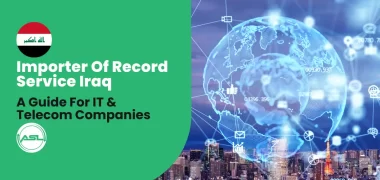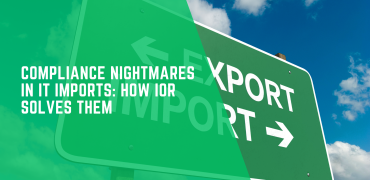The Role and Importance of Importer of Record (IOR) Services in Iraq
As Iraq continues to rebuild and develop its economy, the importance of streamlined and efficient import processes cannot be overstated. One critical component in this process is the Importer of Record (IOR) service. This service plays a pivotal role in ensuring that goods entering the country comply with local laws and regulations, thereby facilitating smooth trade operations. This article delves into the specifics of IOR services in Iraq, highlighting their significance, challenges, and benefits.
What is an Importer of Record (IOR)?
The Importer of Record is a designated entity responsible for ensuring that imported goods meet all regulatory requirements of the destination country. This includes handling customs clearance, paying relevant duties and taxes, and ensuring compliance with local import laws. The IOR acts as the official importer for customs purposes and is liable for all legal aspects related to the importation process.
Significance of IOR Services in Iraq
- Compliance with Local Regulations: Iraq has specific regulations governing the import of goods. These include stringent documentation requirements, adherence to standards and specifications, and compliance with security measures. An IOR ensures that all these requirements are met, thereby preventing delays and penalties.
- Streamlined Customs Clearance: The customs clearance process in Iraq can be complex, involving multiple inspections and approvals. An IOR, with expertise in local procedures, can expedite this process, reducing the time goods spend in customs and ensuring quicker delivery to the end destination.
- Risk Management: By assuming legal responsibility for the importation process, IOR services mitigate risks associated with non-compliance, such as fines, confiscation of goods, and legal issues. This allows businesses to focus on their core activities without worrying about regulatory hurdles.
- Cost Efficiency: Navigating the import regulations in Iraq without local expertise can lead to costly errors and delays. IOR services, with their knowledge and experience, help businesses avoid such pitfalls, leading to significant cost savings.
Challenges Faced by IOR Services in Iraq
- Regulatory Complexity: Iraq’s import regulations are subject to frequent changes, making it challenging for IOR providers to stay updated and compliant. Continuous monitoring and adaptation are required to navigate this dynamic environment.
- Security Concerns: Given the geopolitical situation in Iraq, security is a significant concern. IOR services must ensure that imported goods are not only compliant with regulations but also meet security standards to prevent any threats.
- Infrastructure Limitations: Iraq’s infrastructure, though improving, still faces limitations that can affect the import process. IOR services must be adept at managing logistics in a challenging environment to ensure timely and safe delivery of goods.
Duty and Tax Structure on the Import of IT & Telecom Equipment in Iraq
Overview
Importing IT and telecom equipment into Iraq involves navigating a complex framework of duties, taxes, and regulations. These financial obligations are designed to protect local industries, generate revenue, and ensure that imported goods comply with national standards. Below is an overview of the key components of the duty and tax structure for IT and telecom equipment imported into Iraq.
Key Components of the Duty and Tax Structure
- Customs Duties
Customs duties are the primary form of taxation on imported goods, including IT and telecom equipment. The rate of duty applied depends on the type of equipment and its classification under the Iraqi tariff system. Generally, customs duties in Iraq can range from 0% to 30% of the CIF (Cost, Insurance, and Freight) value of the goods. For IT and telecom equipment, the rates are often on the lower end of this spectrum, given the strategic importance of these technologies for development.
- Value Added Tax (VAT)
Iraq has been considering the implementation of a Value Added Tax (VAT) system, which would apply to a broad range of goods and services, including imports. While the specifics of the VAT rate are subject to change and depend on the finalization of the legislation, it is typically expected to be around 10% to 15% of the goods’ value.
- Excise Taxes
Certain categories of IT and telecom equipment may also be subject to excise taxes. These taxes are typically levied on goods that are considered luxury items or those that have a significant impact on health or the environment. However, excise taxes on IT and telecom equipment are relatively rare compared to other categories like tobacco or alcohol.
- Other Fees and Levies
In addition to customs duties and potential VAT, importers may face other fees and levies. These can include:
- Inspection Fees: Costs associated with mandatory inspections by relevant authorities to ensure compliance with Iraqi standards.
- Handling Charges: Fees for the handling and storage of goods at ports and customs facilities.
- Customs Clearance Fees: Fees charged by customs brokers for facilitating the clearance process.
Import Process and Compliance
To successfully import IT and telecom equipment into Iraq, importers must adhere to several procedural requirements:
- Product Classification and Tariff Code: Accurate classification of goods under the correct tariff code is essential to determine the applicable duty rate.
- Documentation: Importers must provide comprehensive documentation, including invoices, bills of lading, certificates of origin, and any required licenses or permits.
- Standards Compliance: IT and telecom equipment must comply with Iraqi standards and technical regulations. This may involve obtaining certification from relevant Iraqi authorities.
- Payment of Duties and Taxes: All applicable duties and taxes must be paid before goods can be released from customs.
How ASL as an Importer of Record (IOR) Service Provider Can Provide Excellent Service to IT & Telecom Companies
The Importer of Record (IOR) services are vital for IT and telecom companies looking to navigate the complexities of international trade, especially in markets like Iraq. ASL, as a dedicated IOR service provider, can offer unparalleled support and expertise, ensuring smooth and compliant import processes. Here’s how ASL can provide excellent service to IT and telecom companies.
- Expertise in Regulatory Compliance
- Streamlined Customs Clearance
- Risk Management
- Cost Efficiency
- Logistical Support
- Customs Brokerage Services
- Personalized Service
- 24/7 Customer Support
Conclusion
ASL, as an Importer of Record service provider, is well-equipped to support IT and telecom companies in Iraq. By leveraging its expertise in regulatory compliance, efficient customs clearance, risk management, and personalized service, ASL ensures a seamless import process. This allows IT and telecom companies to focus on their core business activities, confident that their import needs are in capable hands. With a commitment to excellence and customer satisfaction, ASL stands out as a reliable partner in the complex landscape of international trade.




